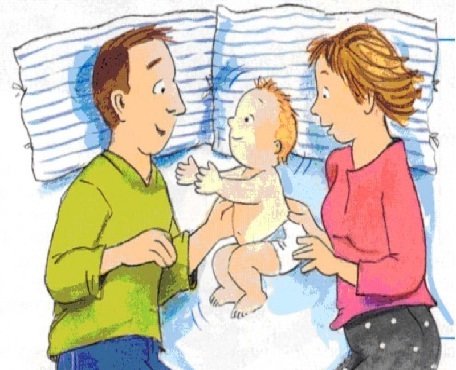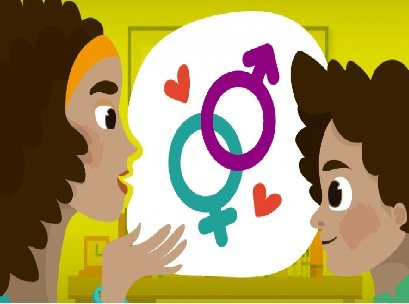Sexuality and Gender. The balance Between Healthy and Rewarding.
Although it is often considered at a secondary level, sex education for boys and girls is as important as their diet or shelter.
In today's world, sex and sexualized objects are used to sell the impossible. Messages loaded with sexual content, openly or veiled, are everywhere, especially in the media, configuring a scenario in which the day to day lives of our sons and daughters. However, the general rule of all these messages is that the information they provide is not truthful or informative, much less useful.

However, despite the recognition of the importance of talking about sexuality with our children, still in these times it is difficult for many fathers and mothers. Undoubtedly, it is good to act under a guide, considering certain guidelines on how is the normal development of sexuality and looking for our children to achieve a satisfying and gratifying life also in this field.
The importance of knowing
Parents are the models that guide and guide the development of each other's sexuality, as well as the assessment of it. In fact, depending on the experiences lived in the home during the first years, children will, in the long term, have positive, negative or confused feelings about their sexuality.
Because of this fact, it will be extremely important to generate in the home an environment of trust and communication so that children are able to ask all the questions that generate concerns about this issue, to express their doubts and talk about the fears they suffer.Definitely, knowing and understanding sexuality helps children to manage their emotions about it, and to support the pressure they may receive from their parents and from society in general. Also be able to make own and autonomous decisions, as well as allow yourself to establish loving relationships at the right time.
About the quantity and quality of information
Even if they are adults who live sex and sexuality in a healthy way, many fathers and mothers experience some discomfort when dealing with these issues with their children
What are the most frequent reasons why this happens?
Doubts about information: Parents tend to consider that the information provided to their children may be excessive for their age.
Drag the information itself. Perhaps, at the time, few fathers and mothers had the opportunity to talk about sex and sexuality with their own fathers and mothers; perhaps they developed in a medium in which sex was forbidden and was even considered as a source of shame.
Doubts about the method. It is also common for fathers and mothers to feel that they do not have the right answers for the sometimes surprising questions of their sons and daughters, and then they do not know not only what quantity and quality of information should they give them, but also doubt about what words use, or if it is convenient to use visual aids, such as pictures or photos.
Non-acceptance: Talking about sex with the sons and daughters, implies accepting that they are sexual beings and that they are growing, which, without a doubt, is not easy to face and accept.
Review these reasons and identify which ones correspond to us as fathers and mothers, if that is the case, it helps to solve them. And is that what should be clear is that, although the subject may seem difficult or embarrassing, you should not avoid talking to him.
the children begin the knowledge of their body to understand that it is normal that they have questions, the same ones that will be very basic first and will later become complex. In view of this, a starting point that can not be left aside and that forms the basis of the subsequent dialogue is that children know the real names (and not deformed by shame poorly understood) of each of their sexual parts and that they refer to them with the same naturalness with which they talk about other parts of their body. This will represent a direct message that sex is not shameful or taboo at home.The long road of sexuality
The approach that should be given to the sexual education of children will depend on the stage of development in which they find themselves.
Up to two years
The relationship that children have with their parents during their first years will mark a feeling of security and their self-esteem. Therefore, it is very important that they can explore their body without receiving negative comments or punitive measures. From very young they explore their body and discover that it is nice to touch their sexual organs. However, parents must teach, with love and respect, and without embarrassing their children, which is a private activity, because in fact it is very different for a boy or girl to do it in their bed, to do it in front of your classmates, to give an example.
Between 3 and 4 years
Towards the end of the 2 years, as a result of normal exploration, children discover the differences between the sexes and then, the world will practically be divided between "those who have and those who do not". It is common at this stage to ask to acquaintances and strangers if they have a penis or not. Do not interfere with this search for answers, because the children have made a great discovery: there are men and women. They are also developing a sense of belonging to their own sex. From 3 years old, certainly, you already know that women have vagina and children have penis. His curiosity focuses on reproduction and birth, with respect to what a series of children's theories develop. You are likely to hear them ask if their mom got pregnant because they ate a lot or if their mom does not have a penis because they cut it. Faced with these doubts and fantasies, parents must respond with truthfulness, clarifying and resolving all questioning. Even so, it is not surprising that they continue with their ideas. In this stage, the children go to explore the bodies of others through games, pretending to be doctors or marry
Between 5 and 6 years of age.
After 5 years, children reach greater independence in the search for activities outside the family. Many already identify with their gender and seek to play with their peers of the same sex. Some express rejection towards the little ones of the other sex, while others may be living "romances". Also, in this stage, the first evidences of different sexual orientation emerge. It is important to note that the fact that a child wants to play with typical elements of the other sex or do what the mother or father does, respectively, does not mean that as an adult he will have a homosexual orientation. This happens for different reasons, such as spending more time with one of the parents and this is their only nearby model. Rather than being alarmed, you should consult a specialist. It will also be convenient to share more activities with the father or mother as the case may be.
Between 7 and 12 years old
Beginning at age 7, children enter the stage known as "latency". It constitutes a moment of tranquility regarding their sexuality, in contrast to the previous stage. Children learn, expand their interests around the world, develop skills and become more competitive. They are generally divided into groups by gender and lose interest in mixed activities. In this stage, all the information you should receive is completed. So much so, that girls must handle complete information on menstruation and reproduction, while children should begin to know everything about the development of their genital tract and the possible appearance of the so-called "wet dreams"Puberty and adolescence
Puberty begins with great physical changes, but also with smoke changes. Boys and girls can become more attached to their fathers and mothers, as well as reject their presence. In turn, they may lose interest in the studies and have concerns related to their body. This also affects fathers and mothers, who will have to accept that their son or daughter stopped being small and get used to their adult body. In addition, feelings of insecurity arise in boys and girls, who do not know if they are intelligent, beautiful, lovable and accepted by their groups, which generates anxiety, bad mood, decay and withdrawal. The activities in mixed groups reappear and the first infatuations and disappointments arrive. Also, many will have their own sexual experiences, so it is important to promote communication without being invasive, assuming that much of what they are now, is a product of education and care provided to them.





I think in Puberty kids should avoid sex
If you would like to support the educational community by delegating to @steemiteducation, please click on any of the following links. This will ensure that more teachers are supported on a daily basis.
100SP 200SP 300SP 400SP 500SP 750SP 1000SP 2000SP 3000SP 4000SP 5000SP 10,000SP 25,000SP